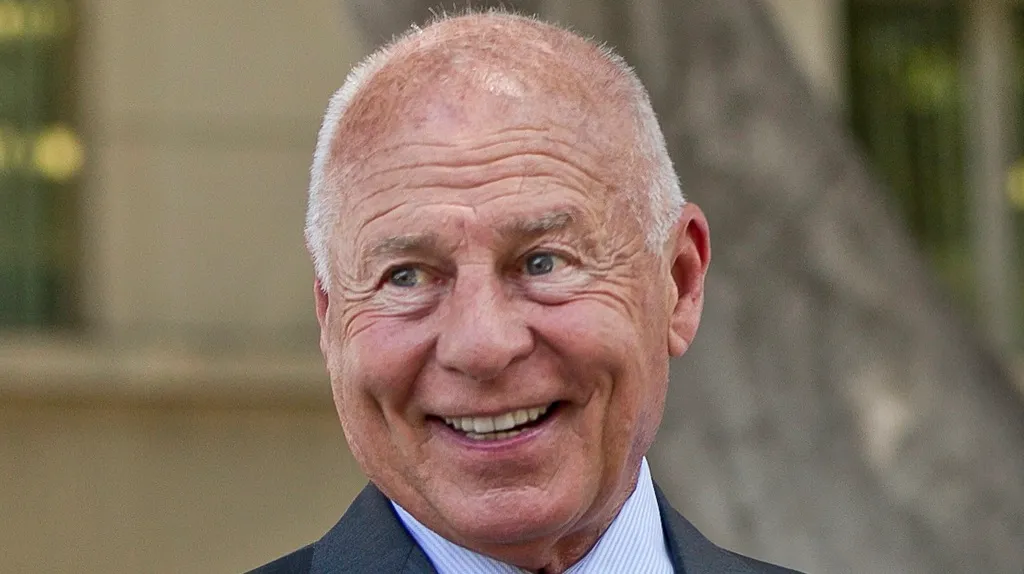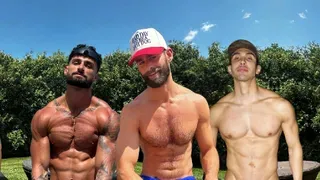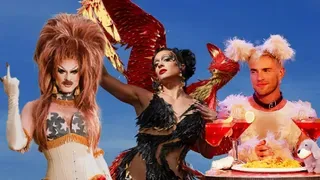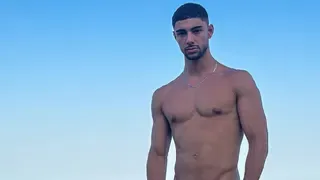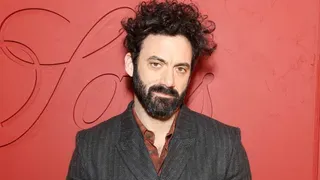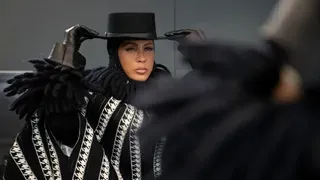November 26, 2008
Milk: The Man, The Movie
Michael Wood READ TIME: 20 MIN.
For LGBT audiences, Milk - the biopic about slain gay-rights activist Harvey Milk that stars Sean Penn - has to be the most hotly anticipated movie of the year. At the press junket held in early November, Windy City Times talked with openly gay director Gus Van Sant, screenwriter Dustin Lance Black and the majority of the film's cast members. Although Penn rarely gives interviews and didn't participate, his fellow cast members had warm things to say about their star. The site of the interviews, the luxurious Beverly Wilshire Hotel (memorable to filmgoers after being featured in "Pretty Woman") was a stark contrast to the serious, though lively, discussion of Van Sant's film, which eerily captures its subject and the early grassroots, scrappy style of Milk and his followers. (See my separate review of the film in this issue as well.) In another moment of irony, the junket occurred just days after the passing of the anti-same-sex-marriage initiative Proposition 8. That was discussed along with the film's long gestation, the importance of the movie to both gay and straight audiences, and James Franco's love scene with Sean Penn.
Note: Certain little-known plot points and perspectives related to the movie are revealed in the interviews.
Gus Van Sant and Dustin Lance Black Milk director Gus Van Sant and the film's screenwriter Dustin Lance Black, both openly gay, discussed the movie.
Q: Gus, does the fact that you're openly gay give you a different or better perspective or insight into telling this story?
Gus Van Sant: Hmm, that's a good question. I think it's probably like, you know, people claim they can see the work of a gay director like a female director and a straight director; they can see it their style, where the vibe or maybe what the focus is. So maybe in that sense, but it's hard for me to tell.
Dustin Lance Black: If I can tell whether you're directing gay or not? Not really, not really.
Q: How did the project come to you?
GVS: I first heard about it through Rob Epstein-who was the maker of The Times of Harvey Milk-and it was an Oliver Stone project, and then Oliver dropped out. The reason Rob mentioned it was because Oliver had dropped out and I took over for about a year. We developed a script and then we [had] a disagreement about the script. Then, years later, Lance showed up with a different script.
DLB: Many years later.
GVS: Like 15 years later.
Q: The film is coming out just at the time of Proposition 8. Do you think if there were more people out in Hollywood that Proposition 8 might have been rejected?
DLB: Well, when you see the film you see that there's a very different strategy in defeating an anti-gay proposition in the movie; in fact, it takes kind of an attack on a closeted campaign in the movie. Harvey does [it] directly, which was sort of a theme for Harvey: self-representation. That was missing in the campaign for Proposition 8, I think. We didn't hear the word "gay" in much of the mainstream campaign for No on 8. There were no gay people depicted in it. We sort of never introduced ourselves and said, "Hey, we're the ones that it's being taken away from," and that was really the opposite approach for Harvey. To me, I think it's a important piece of our recorded history to help people understand how we did succeed at one time; how we successfully beat these things using a very different approach, an approach of self-representation and really saying, "Hey, I'm the guy who's going to get hurt," and having that sort of bravery-that belief that if they know you, they're not going to vote against you.
Q: Did you approach Tom Cruise about playing Dan White?
GVS: Yes, both times I was working on the project. The first time I talked to him, he was on the set of "Eyes Wide Shut" and, this time, Matt Damon was going to play the role. When he bailed, I think Tom Cruise was the next guy, and he checked it out and decided not to do it.
Q: How do you go about directing a talent like Sean Penn?
GVS: When we had our first meeting, Lance came to his house and we sort of were ready to get into-I was ready to get into it hardcore-and he said, "I'm not ready to talk about the politics. I guess I just need to learn my lines and show up on time." I thought, "Wow, that's what we want him to do." You know, make it simple-and that's what he was thinking. He would explain really succinctly how he worked like, "I will do this," and me reacting to that. I think one of the things he said at the Toronto Film Festival when we had just started working on it, barely, was... Somebody asked him how he gets so fired up making his own speeches when he gets up in front of the press and makes these sort of doctrines or statements and he said, "Well, this is something my director should know-I have to get very angry to really do that, to make a good speech or performance" and I was like, "Okay, we'll figure that out. How does it work?" [Then,] I thought, "I guess I could throw coffee at him." [Laughter from the room] But it helps the performance. He didn't look to me for the anger, fortunately, but he found it in his own way of, like, getting himself angry for certain scenes, like the speeches in particular.
Q: With you writing in this theory that Dan could have been closeted - was that something that came out [during] your research or something that you added?
DLB: It's both, but it's also Harvey's perspective, and Harvey had said that to several people in the last two weeks. Harvey had mentioned it to several of the folks that they worked with at City Hall. He actually did it as a warning. He said, "You know I'm worried that Dan might be a closet case," and that seemed dangerous to him.
GVS: But also, it's not the statement of the movie that Dan was a closet case. It's something that Harvey says, and it's not really the perspective of the movie.
DLB: No, it's a Harvey theory and Harvey has a lot of theories that he spouts off during the movie. It doesn't mean that they're true or not. I don't think we'll ever know what Dan White's sexuality was.
Q: Can I ask quickly about the lack of the lesbian presence in the film? Is this an accurate historical representation?
DLB: We struggled with that. That's a really good question. I talked a lot with [Harvey Milk aide] Anne Kronenberg about that and she helped. I have a lot of lesbian friends and it did seem like they weren't there when you look at the pictures of the Castro. It's like, "Where were the women?" and finally I found out they were up on Valencia Street-that had their own sort of movement going on up there. It was very separate and Anne bridged that gap for the first time.
Q: Gus, what do you want people to take away from the film? Should gay audiences get something different than straight?
GVS: No, though it's about a community that they're a part of. It's about, to me, grassroots political organizing and making it work-and that you can do it.
Josh Brolin
Josh Brolin plays Dan White, the assassin of Harvey Milk and San Francisco mayor George Moscone in the film.
Q: Do you think White was a closet case, as Harvey Milk suggests in the film?
Josh Brolin: I don't know. I don't know.
Q: Did you play it that way?
JB: No. No, but if I did there was only one place that I might have-but it was more about the need to connect with somebody and resenting myself knowing that I had the need to connect-[it] was during the scene in the lobby between Sean and I, which was written as a very straight scene. I was just supposed to be late for his birthday and then give him a bottle of alcohol; then I said to Gus, "What if I drank the alcohol before I got there?"Then we started playing with that, and then it sort of had a life of its own and Sean looked worried, which was actually very sweet.
It's possible but it's possible for anybody. You don't know. Is there a connection between homophobia and latent homosexuality? I don't know. I can only speak for myself. I have no problem with [homosexuality]. I've been around gay people my whole life. It doesn't bother me; it doesn't bother me for my kids to be around gay people. It just doesn't bother me. If they try to ... it might bother me a little bit but that's anybody, whether you're gay or heterosexual; you're always looking out for that. So I don't see it as creepy or weird, and I've known so many people that are so happy in those relationships. That's all that matters to me.
Q: How did Dan White kill himself, and what was the status of his marriage?
JB: He slept on the couch a lot. I don't want to tell you too much because I know a little too much. But I do know that he slept on the couch a lot, that there was some strife, that he was not welcomed back to San Francisco, that he forced himself back. I do know that he got seven years [at Soledad State Prison] and got out in five. Then he came home and, 18 months later, he killed himself by putting a hose in the tailpipe. He had an Irish ballad going about how much he loved the city, going on a loop in the car. It was sad, you know?
Q: How do you feel about the movie coming out with Proposition 8 happening at the same time?
JB: There's a grand parallel and you feel like you've evolved but you feel like the gay society has become more mainstream, and then something like this happens-which was a huge surprise for me.
Q: Can I bring it back to Hollywood actors not being out or being afraid to be out? Harvey's strategy was so clearly, "People have to know who we are. We're your brother, your mother, your everything." I don't think there's a major male star out at this point. Do you feel like that might have made a difference and that Harvey was right?
JB: Harvey was an anomaly, and that's why there's a movie about Harvey Milk and not closeted whoever-it-is. It takes a certain mentality, a certain heart, a certain passion, a certain wherewithal. Dan White didn't have that.
Q: Did you find any parallels between Bush and Dan White?
JB: No. [Laughs] No, other than one is very minutely involved on a small scale and one affects the entire earth. No, honestly.
Q: Your stepmother [Barbra Streisand] is like the ultimate gay icon. Are you aware of your gay following because, you know, you have one?
JB: No, that's great. Any following is great. I mean except for a Satanic following. [Laughter in the room] She's the great gay icon?
Q: She is.
JB: Why, though? Is it the music?
Q: It's because she's the ultimate individual.
JB: She's the ultimate individual?
Q: Didn't you know that?
JB: It doesn't matter what I know. I'm going to tell her you said that because that's amazing. That's like the greatest compliment you could ever get.
Q: When are you and your wife [Diane Lane] going to do something together?
JB: Never. We could never do it. We would spend so much money on outtakes because we would laugh and laugh and laugh. It would be a complete and total failure. I think couples who start out meeting in movies and all that have a much easier time doing that. I don't think we could ever imagine doing that.
James Franco
Milk star James Franco plays Scott Smith, Harvey Milk's first lover.
Q: How did you get involved with the movie?
James Franco: I've known Gus for five years. Then, two summers ago I was in England studying literature and my agents called and told me that Gus was doing this movie on Milk, and they said I might want to get involved. Just being the biggest Gus Van Sant fan and knowing how important this movie was to him and how important the story was, I wrote him an e-mail and said basically, "I'll do anything in this movie just to be a part of it." I would have played the pizza guy but he gave me this great role.
Q: Your character is often subordinate-he's eye candy in the pool scene, the wife in the dinner scene [and] a sort of supportive sidekick, but he registers strongly because of your performance. How did you approach the character so he wasn't just in Milk's shadow?
JF: I had never been offered the housewife role before and I thought it was a good opportunity to play something different. When I started researching who the real Scott Smith was, I figured that this movie is called Milk, not Smith. It was important to play the person that was going to be the emotional grounding to Harvey's huge ambitions. I needed to play that supportive character as well as I could. That would show a loving relationship in contrast to all the political stuff in the movie. It would take what would just be a political movie and bring it down to a personal level because of this relationship that, hopefully, feels real and true.
Q: Do you think this story is better served being told by a director who is gay, and is it a disservice to any of the gay characters that most or all-for all I know-are played by actors who aren't gay?
JF: That's hard to say. In any art form, more often than not, if you have somebody who is personally involved with an issue or feels close to a piece of art in some way, it's going to result in something more personal. The fact that Gus felt so strongly about this movie-I guess, because there are a lot of issues that relate to his own life-I'm sure it helped the movie. I don't know if a gay actor could have played my role better than I did. I just know that I feel strongly about all the issues that Harvey was fighting for and hopefully, my passion for those issues were enough for me to devote myself to this character. But, inversely, you wouldn't want to preclude actors who are gay from being able to play straight roles and so to say only gay actors can play gay roles would be detrimental in the inverse way as well, I think. I don't think that's the way to go.
Q: How do you think the straight dudes that loved "Pineapple Express" are going to react to "Milk"?
JF: [Laughs] I basically saw "Pineapple Express" as a love story, so they've already been bathed in that. I played that character like I was in love with Seth Rogan's character so ... I don't know how they'll react. [Laughs] I can't decide movies based on, "Oh, the people that liked that movie might not like this movie." If anybody who saw me in "Pineapple Express" and wouldn't normally see "Milk" but they'd go because they like Saul I think that's a good thing. I just have faith in the movie's message; I just hope it gets across.
Q: Is there a difference between playing a real guy and a fictional character?
JF: I try to take all my movies seriously. I do research. On Spider-Man, I was playing a kid who went to boarding schools and stuff. I stayed over at boarding schools and hung out with those kids. I mean, I try to take every role seriously. This movie certainly felt different. But Gus, thank goodness, makes everybody so relaxed to the point where it results in more natural performances.
Q: What about doing those love scenes with Sean Penn?
JF: What do you want to know?
Q: Well, you talked about doing research for all your roles. [Laughter in the room]
JF: In most of the other movies I've done I've had at least one kissing scene with a female actor and I don't think it would've flown if I'd said [to Sean], "Hey, we should go research that love scene back at my hotel." It's just not what actors do. Most people know how to kiss and you just show up and just do it and that's it. [Laughs]
Emile Hirsch
Milk star Emile Hirsch (Into the Wild; Speed Racer) plays Cleve Jones, Harvey Milk's fellow gay activist.
Q: How did you come on board?
Emile Hirsch: I had met Gus once before. He made, I think, [the 2005 film] Last Days and we just had a meeting. We chatted and he was looking to cast a couple of the band people in that and we got along well. After he saw Into the Wild at the Toronto Film Festival premiere, he told me after that he was thinking of putting me into the movie, and that he brought up the idea to Sean and he agreed-although I can't imagine Sean agreeing too easily after spending so much time with me on Into the Wild. There's got to be a part of him that would just be like, "I've got to get away from this guy." [Laughs]
Q: Did you have a completely different relationship with him on this?
EH: Yes. He was very focused on his part the whole time. It's like playing basketball with the coach. It's not something you're used to. I was very used to the other way and it was a little strange, but it was great and was a reminder of what an extraordinary actor he is.
Q: Was it intimidating to have Cleve Jones, the character you played, on the set every day?
EH: Cleve had a very strong personality, but for some reason we got along really well. We always had a lot of fun; we had a very jokey, mischievous kind of relationship. But we care about hearing other people's stories. I did like the pressure [that] having Cleve on set every day brought. It upped the stakes a little bit.
Q: Has Cleve's example as a gay-rights activist and Harvey's inspired you to champion a cause of your own?
EH: Absolutely. Absolutely and working with Sean and Gus and being involved on Into the Wild with [Christopher] McCandless, who has donated his life savings to Oxfam [an international rights group]. I got involved with Oxfam through Into the Wild and I'm helping them raise awareness about the Congo, so I went there this summer for a week and to different places. It's really just trying to get the word out there about what Oxfam does and, hopefully, get people involved.
Q: Does this mean that we're going to see you champion some gay causes as well?
EH: Well, I am in the movie, to start with [Laughs].
Q: That's a great beginning!
EH: So, yeah.
Q: Your character arguably has the biggest transformation in the film-starting out as a hustler and then becoming an activist-but he doesn't have that much time to do that. How difficult is that as an actor?
EH: You have to be focused, and any young actor that's stepping onto a set with Sean Penn [is] bringing [his] A-game; there's just no ifs, ands or buts-you're going to be ready. I kept my eye pretty sharply on where I wanted to go but, at the same time, I wanted things to be able to just happen, and Gus created an environment that let you feel relaxed so you could breathe some life into your role.
Q: Do you have a bag of tricks yet? You're still pretty young at that?
EH: No, no bag of tricks. I have my instincts that I try to work from.
Q: You just did a film with Ang Lee?
EH: Yes.
Q: You also worked with Heath Ledger, which makes me wonder [if] you hope audiences will embrace this film the way they did Brokeback Mountain. I know gay audiences will, but what about mainstream audiences?
EH: Oh, absolutely. I think Heath Ledger's performance in Brokeback Mountain is one of the best I've seen, and I loved working with Ang and I loved Brokeback Mountain. If we could [approach] what Brokeback Mountain was able to achieve-gay people, straight people, everybody was seeing it and just loves that film-that would be a huge accomplishment and we'd be very lucky if that happened.
Q: What else do you have coming up?
EH: The Ang Lee film [Taking Woodstock]. I play a kind of post-traumatic, stressed out young Vietnam vet so my hair was down to here and I had a big beard.
Q: Cleve is very protective of you, you know.
EH: I like that.
Q: When I talked to him in Chicago he said, "I'll beat you up if you're not nice to him."
EH: [Laughs] He's really great, a good friend.
Alison Pill
Milk star Alison Pill plays Anne Kronenberg, Harvey Milk's fellow gay activist and the movie's lone lesbian character.
Q: Is the story better served by a director who is openly gay and whether any of the characters are disserved being played by actors who are not gay?
Alison Pill: I will say that the one thing that I appreciated the most is that the relationships between the men are taken as a given. The story isn't about their discovery of being gay or any of that. Within the first five minutes there's a beautiful love scene between men that's not like, "Oh my God, this is shocking!" It's just as you would in any romance. I think that is something that Gus can definitely do well. Whether a straight director could do it as well, I don't know. The movie isn't about being gay as anything more than a given. That's just the way it was. As for the straight actors-they're all pretty good actors and I don't know whether they should be gay or not, but I think they all did an amazing job.
Q: How involved was Anne Kronenberg with you? Cleve Jones was there with Emile Hirsch on the set every day and it seems that Anne was back a little further.
AP: Anne was back a little further because Anne has a job in the public health department and was trying to deal with a budget. [Laughs] I would have loved to have had her there every single day but she was dealing with San Francisco. When I arrived for rehearsal I got to meet her and sort of recalibrated my character idea based on how she can just rule a room but very much as a woman, not in any overtly aggressive way. She's a den mother and I had come in with a different idea.
They had been filming for a while when I got to the set so I came in literally the way she did-a 22-year-old kid walking into a room of really important gentlemen, being the only girl; everybody's already formed their own cliques and having her there that day was so nice because she was like, "That's exactly what it was like." The film shoot mirrored the political campaign in the movie. We were all away from home staying in one hotel and, of course, we built up our little community. All that camaraderie is just built in.
Q: There's a strange lesbian invisibility in the movie. Did that put more weight on your shoulders?
AP: I know Cleve kept trying to ask, "Where are the ladies?" We shot one scene in which I am the real organizer during one of the campaigns, but there just wasn't enough time in the movie which is unfortunate. The same could be said for what Harvey did with the Chinese community and the seniors. There are hints at it. I wish we could have done more on this because what he did by bringing in the lesbian community and the women's-rights community into his campaign is incredible and crossed a lot of boundaries. I wish we could have seen more women in the movie, definitely, but it's also called Milk and there's a very specific story that needed to be told in order to make it a workable film. Hopefully, somebody will do another film about that side of it.
Q: You've been involved with two projects with two queer icons: Judy Garland and, now, Harvey Milk-a cool coincidence. Is there a third one coming up?
AP: [Laughs] Yes, if you give me a job! There are definitely important stories to be told. I didn't know enough about Harvey Milk and when we were in San Francisco, a lot of gay people in their 20s living in the Bay Area had never heard of Harvey Milk. There's a huge section missing from my generation's education about this. The archival footage that's been worked in so beautifully also speaks to that-I was born in 1985 and I never knew that being gay was a moral issue or an issue at all. I am grateful for that fact, but I am also aware that people need to be taught about the history of it in order to deal with the future.
Diego Luna
Milk star Diego Luna is Harvey Milk's emotionally conflicted lover, Jack Lira, in the movie.
Q: Is the story better served by a director who is openly gay and whether any of the characters are disserved being played by actors who are not gay?
Diego Luna: It makes a difference when we talk about the director. The director has been working with the story for years and dreaming about it every night. It needs to matter a lot to a director. I believe that with a director like Gus, he defends his point of view a lot. He's a guy who has really clear objectives when he's shooting a film. He knows what he wants and the kind of questions he wants to raise. I do believe it was important in this case. With the actors, I don't think so. Acting is the opposite thing. You're getting into a new universe for a few months. If it's very different from your own context and where you come from, it makes it richer in a way. You're also willing to really go deep.
Q: I want to ask about your character. Was it so hard to be that emotionally distraught every day on the set? He's really bipolar.
DL: Yeah, he is but I wanted to find the happiness of the character in a way because he needed to have something for Harvey to like. There was something happening when they were together that was magic, obviously because Harvey was a very interesting man. Harvey was a very fun guy to be around with, so there had to be something about Jack that was special. In my research I was talking to someone and this guy said to me, "You know one day I was walking next to the house and I heard them having sex. It was the loudest sex I've ever heard and there was a lot of laughs and shouts and spanking, and it was like Harvey wasn't Harvey. The sounds were not Harvey." I understood there was something about that relationship that was really special and that it was simple and just instinct, pure instinct.
It was nothing about politics or the movement that mattered. It was about cooking dinner, receiving him, dancing for him. I love that scene where he comes and he broke the door because he wants to cook dinner for him and dance for him, and then he would probably like to have sex and then he can go anywhere he has to. "Just give me 10 minutes," he says, "It will be the best 10 minutes you'll get in your day" and I'm sure they were and that's why he came back and came back. But at the same time, he was a very lonely person, a very sad character and it was never going to be enough for him. It wasn't Harvey's fault or anyone. He was just a guy that was tough to please because he needed so much attention.
Q: Was there anything you learned about Jack that didn't make it into the movie?
DL: I decided to just work with what was in the film because it's a real character.
Q: Can you talk about working with Sean?
DL: Who's Sean? [Laughs] I have to say the guy I met on the set the first day was a different guy. The way he became Harvey Milk was amazing. Not just physically but, you know, Harvey was a very happy person, the kind of guy that was able to turn negative energy [into] positive energy. He was the kind of guy that, if the news was that you lost the elections, he would hear there were people voting for you this morning and Sean did have a lot of that energy in his eyes. It was a different Sean than any other film I've seen him in and, as an actor, he's a guy that understands acting is sharing and that makes everything easy. It's a guy that's searching for your eyes, looking for the exchange. He wants to see what's happening to you and react to that-when someone is that good and when someone has achieved so much they don't have to pretend at all.
Q: Who was the better kisser-Sean Penn or Gael Garcia Bernal [his co-star in Y tu mam? tambi?n]?
DL: I have to say that in both I was paid for, so ... I cannot say. I cannot tell.
Michael Wood is a contributor and Editorial Assistant for EDGE Publications.
